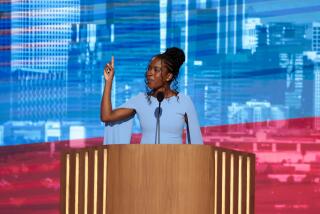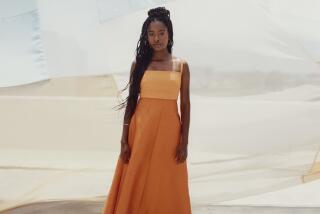Thereâll Be No Bard at the Inauguration
Finally, the kingmakers unfurled their plans for the grandest of days, with no pause in the pageantry for the voice of a poet. O George W., the poets ponder, as they are wont to do, how could you not embrace us on the loftiest perch in the land?
On Jan. 20, President-elect George W. Bush will take the oath of office in a swift swearing-in ceremony, according to details released by the Presidential Inaugural Committee this week. Remarks will be limited to the humdrum business of the call to order, invocation, inaugural address and benediction. Which leaves arts observers to wonder:
If we mark the intimate and the inclusive events of our lives with poetry--the weddings, the funerals, the public ceremonies--why not this one? Especially at a time in which the vibrancy of poetry in America is unmistakable, at a time in which the president-elect again and again pleads for unity. Why not through verse in a way that transcends politics?
Only three other presidential swearing-in ceremonies in U.S. history have included a poet. This year, the Inaugural Committee did not necessarily decide to exclude an inaugural poet, said committee spokeswoman Natalie Rule. (Committee members include Bush campaign veterans.) They simply wanted to follow the president-electâs request to keep the ceremony simple, Rule said. She does not know whether they even looked into the possibility of inviting a poet on such short notice. âThe actual swearing-in is very traditional,â Rule said. âThe whole focus is going to be on this unbelievable event that happens every four years, in essence, when we swear in the leader of the free world.â
Perhaps, some suggest, Bush simply did not know a poet to whom he could turn. His predecessor, on the other hand, is a well-known lover of poetry. President Clinton famously gave Walt Whitmanâs âLeaves of Grassâ to Monica Lewinsky and has cited âConcord Hymnâ by Ralph Waldo Emerson as his favorite poem. But Bushâs public remarks on literary arts have been limited. In late 1999, the media belittled him for naming Eric Carleâs âThe Very Hungry Caterpillarâ as one of his favorite childhood books--the story wasnât published until 1969, when the president-elect was 23 and just out of Yale University.
By not tapping an inaugural poet, Bush is reinforcing his reputation as a literary flyweight, said Susan Wood, a poet and professor of English at Rice University in Texas. âI think itâs a missed opportunity on his part,â she said. In W.H. Audenâs poem âIn Memory of W.B. Yeats,â Wood said, Auden wrote the line âpoetry makes nothing happen.â But, she added, âI donât think thatâs true. I think poetry makes a lot of things happen. It does change lives. In some ways, poetry helps us live our lives--it helps us not to be despairing, or it helps us to be human or to be empathetic.â
Itâs no accident that the president-elect will not make room for a literary artist on his highly symbolic stage, poet Ed Hirsch insisted. âIt shows a great disrespect for art, and a sense implicitly that poetry does not matter, at least not on such an occasion,â said Hirsch, a University of Houston English professor and winner of a âgeniusâ award from the John D. and Catherine T. MacArthur Foundation. âThe inclusion of poetry [would mean] the inclusion of the voice of the poet in the larger culture.â
In the past few years, experts say, contemporary poetry has resonated in the lives of everyday Americans. Through raucous poetry slam competitions. Through National Poetry Month events in April, coordinated by the Academy of American Poets. Through popular PBS specials such as Bill Moyersâ âFooling With Words,â about the countryâs largest poetry festival, which takes place in Waterloo, N.J. Through former U.S. poet laureate Robert Pinskyâs Favorite Poem Project, which includes a book and online archive of the beloved verses of a diverse group of people from Clinton to everyday Americans. (A student identified as John Ulrich of South Boston, for instance, picked âWe Real Cool,â by Gwendolyn Brooks, the late Pulitzer Prize-winning poet).
An inaugural poet, some say, would have been an important way to underscore poetryâs impact in America. Not many remember Arkansas poet Miller Williams, who read his poem âOf History and Hopeâ at Clintonâs second inauguration in 1997. But the two other inaugural poets just about stole the show.
In January 1961, white-haired Robert Frost walked to the lectern just before John F. Kennedy was sworn in at noon. Frost, 86, unfolded a new poem but could not read the words in the blinding winter sun. Vice President Lyndon B. Johnson rose and tried to shield Frost with his top hat, but the poet put his papers aside. On that cold morning, he recited instead by heart âThe Gift Outright,â one of his earlier works: âThe land was ours before we were the landâs. . .â And, with that, the poet turned an aching moment into a noble one, symbolic of Kennedyâs presidency, said English professor Earl J. Wilcox, editor of the Robert Frost Review at Winthrop University in South Carolina. âI think it was the kind of thing that Jackie Kennedy could always allude to: âSee, we had Camelot occurring from the very beginning,â â Wilcox said.
And consider Clintonâs first inauguration in 1993, following 12 years of Republican rule in the White House. Inaugural poet Maya Angelou, an African American, a grandmother and a playwright, was hailed as a symbol of a new day. At 64, her bearing was powerful, her voice majestic. Observers later scrambled to get copies of her inaugural poem, âOn the Pulse of Morning,â which celebrates the countryâs diversity: â. . .the Asian, the Hispanic, the Jew, the African, the Native American, the Sioux . . . the Gay, the Straight, the Preacher, the privileged, the homeless, the Teacher.â
New York poet Carl Hancock Rux is not a big fan of Angelouâs poetry, but he was touched by how she infused her verse with the influences and rhythms of her life, proudly and openly, on a national stage. âIt meant a lot to me,â said Rux, an experimental poet-performer, who has written and performed his poetry for the Alvin Ailey American Dance Theater. âTo me, when she was up there and read her poem, she brought [jazz drummer] Max Roach and Billie Holiday, and the whole idea of what a family is, and how she structured her life, with a sense of nobility and integrity--she brought all those years and all those people to the podium, and I was in awe.â
Poet Gary Soto did not vote for Bush. But, even on such short notice, he would have put his politics aside and written a poem for his inauguration, if asked. âWe would be rubbing elbows next to the president and the Supreme Court. Itâs a wonderful occasion to bring the poet into the limelight,â said Soto, a two-time National Endowment for the Arts fellow and professor of creative writing at UC Riverside. âIt just helps the poet; it helps the literary life of this country.â
Soto was reluctant to read too much into a presidential inauguration that fails to include a poet. But he was so happy when Clinton picked two in a row that he finds Bushâs omission worrisome. âThere is no tradition now,â he said. âIt could be simply X-ed out.â
More to Read
Sign up for our Book Club newsletter
Get the latest news, events and more from the Los Angeles Times Book Club, and help us get L.A. reading and talking.
You may occasionally receive promotional content from the Los Angeles Times.









